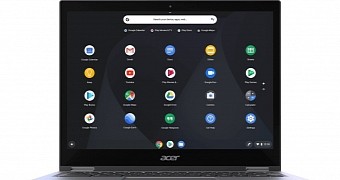Parallels has just announced dedicated software aimed at enterprise Chromebooks that would allow customers to run Windows apps on Chrome OS.
With this release, pretty much any application supposed to run on Windows can now be used on a Chromebook too, including here not only the likes of Microsoft Edge but also the Office productivity suite.
And since it’s the enterprise market we’re talking about here, it’s no doubt that bringing the full Microsoft Office suite to Chromebook is a major win for Google and its customers.
Running Windows apps on Chromebooks is possible without an Internet connection and side by side with Chrome OS apps.
“Run Microsoft Office and other full-featured Windows apps directly on an enterprise Chromebook. Easily add chart trendlines in Excel, captions and citations in Word, and custom fonts or headers and footers in PowerPoint—capabilities that are not available in other versions of Microsoft Office— while simultaneously working with Chrome OS apps. No need to reboot or to use unstable emulators,” Microsoft says.
One-month trial available
At the same time, customers are provided with integrations between the two operating systems, including a shared clipboard and support for setting Windows applications to open files on Chrome OS. More importantly, Parallels allows for a shared user profile to be used on Chrome OS.
“Windows user folders (Desktop, Documents, and Downloads) are redirected to the Windows files section in Chrome OS to ensure access to files by Chrome OS applications without creating duplicates. Additionally, this allows Chrome OS to access these files when Windows is not running,” the company explains.
Parallels Desktop for Chromebook Enterprise is already available today for companies that want to enable Windows apps on Chrome OS. However, it’s quite an expensive product, as it can be purchased with a $69.99 subscription per year for each user. A one-month trial is offered with five user licenses.

 14 DAY TRIAL //
14 DAY TRIAL //